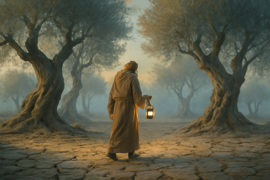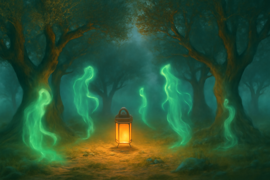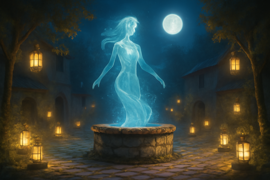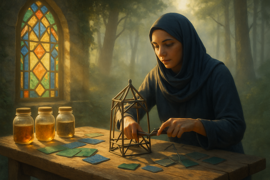Introduction
Beneath a sky brushed with the first light of dawn, the city of Ramallah stirred to life. Minarets cast long, graceful shadows across sun-warmed stones, and the hum of the town square rose like a whispered promise of new beginnings. At the edge of the bustling market–where merchants laid out bolts of embroidered canvas and the air was heavy with the scent of za’atar and freshly baked flatbread–stood a modest workshop of weathered cedar planks. Inside, pale shafts of morning filtered through stained-glass windows, illuminating jars of olive oil resin, copper filaments, and delicate sheets of colored glass. Zeinab, known across the hills as the Lantern Maker, bent over her workbench, her fingers steady despite a heart weighed by stories of drought striking the lands beyond Ramallah’s walls.
Every lantern Zeinab created carried a fragment of hope. She believed that the olive groves encircling the town were guarded by ancient spirits, whose presence thrived on the glow of her creations. Villagers would come seeking her lanterns when the nights grew long and the fields were thirsty, placing them at the roots of gnarled trees to coax moisture from the soil. By winter’s end, hundreds of lamps had soared like a constellation across the groves, guiding the spirits to return life to battered branches and coaxing new shoots from parched earth.
But this spring, something shifted. The lanterns’ light faltered, flickering like wounded birds before dimming entirely. Farmers watched helplessly as buds shriveled into brittle shadows, and a hush fell across the hills. Even Zeinab’s own creations began to crack, glass panes splintering from some unseen sorrow. Determined to revive the light and answer the land’s silent plea, she prepared to journey beyond her workshop’s threshold into olive groves where spirits murmured in olive-leaf rustle and ancient springs lay hidden beneath moss-covered stone.
The Maker’s Legacy
Zeinab was born to a family of artisans whose lineage was etched into every piece of pottery, each tapestry, each carved olive wood bowl. Her mother, Aisha, wove stories into her loom, threads dancing across cloth to depict the heroes of Palestine’s past. Her father, Hisham, shaped ceramics with calligraphic elegance, inscribing verses from ancient poets on vessels that had traveled the earth. Zeinab’s lanterns, however, were her own language–a synthesis of her parents’ gifts and a calling whispered by olive spirits as old as the hills.

From her earliest memories, Zeinab recalled the hush of olive branches swaying above her grandmother’s knee. Grandmother Layla would hold her hand, press it against the cool bark, and murmur, “These trees remember every footstep. They keep our secrets, our dreams.” As Zeinab grew, she learned to tap the resin pockets deep in the wood’s heart, extracting the amber tears that would bond with olive oil to burn bright. Under Layla’s guidance, she mixed petals of wild rosemary and frankincense powder into molten resin, trapping the scent of pine and sacred smoke inside glass panes tinted with crushed pomegranate skins.
Word of Zeinab’s lanterns spread beyond Ramallah’s alleys. Travelers spoke of a lantern whose flame mirrored the color of an olive leaf at dusk or a lamp that hummed softly as though breathing. They claimed its glow could calm restless hearts, serve as guide for nomads lost to shifting sands, and even call forth longing souls back to home. Merchants came from Nablus and Bethlehem, and from Hebron’s workshops of soap and pottery, each requesting a lamp to carry across the Jordanian plains. Zeinab welcomed them all, selling lanterns for what coin she could ask, but giving without question to those who arrived with empty pockets and urgent prayers.
Yet as her reputation grew, the land beyond Ramallah’s city walls trembled under a creeping drought. Springs that once gushed clear water now trickled to dust, and olive trees sagged under the weight of parched branches. Farmers stoked the lamps at their fields’ edge night after night, offering light to the spirits they believed had fallen into slumber. Zeinab watched with growing alarm as each new lantern she lit at sunrise shattered in the heat, its radiant promise smoldering into ruin. When a crack ran through her own front window like a tear across her heart, she understood that the time had come to venture into the olive groves and answer the silence she had long relied upon others to interpret.
On a clear morning suffused with the scent of sage and earth, Zeinab packed her leather satchel with tools of her craft: copper shears, pots of resin, flasks of olive oil, and vials of herb-infused water. She placed a single glowing lantern at her feet–a final offering to the spirits whose favor she would seek. As she stepped beyond Ramallah’s sandstone gates, the city’s call faded behind her, replaced by the susurrus of leaves and distant murmurs of roots stretching through sunbaked soil. Every cracked stone underfoot, every bleached remnant of wild thyme, spoke its own story of struggle. Zeinab’s journey had just begun, but her resolve burned brighter than any flame she carried.
Spirits of the Olive Grove
The grove’s entrance mouth was a tunnel of branches woven tight above Zeinab’s head. Each step into the green gloom felt like a threshold between worlds–one of human toil and another of ancient soil and secret dreams. The ground beneath her boots was littered with olives struck by sun, their skins shriveled to black stones. Yet even amidst drought’s clutch, patches of resilient wild thyme and rosemary nodded their gray-green heads, releasing aromatic promise into the air.

Zeinal reached a clearing where an ancient olive, its trunk thick as a caravan, stood sentinel. Its bark bulged like the folds of an aged face, and roots coiled across the ground like slumbering serpents. Here the earth felt alive, vibrational underfoot, resonant with ages of ritual and reverence. She knelt, set her lantern at the base of the tree, and drew a shallow bowl from her satchel. In its center, she poured olive oil mixed with resin warmed by the lantern’s flame and whispered prayers her grandmother had taught her. The oil gleamed in the lantern’s glow, and she watched for ripples in the scattered dust.
At first nothing happened. The wind was still. The shrubs surrounding her stood silent, as though holding breath. Then, from the depths of the grove, came a whisper–a susurration like dozens of voices inhaling at once. The lantern’s light shimmered, dancing across the bark’s face, and fissures of golden luminescence cracked along the tree’s trunk. Zeinab’s heart pounded. She remained still, voice soft, singing an old prayer of spring:
“Ya naba‘ al-hay, ya raṭbi al-ard, jilli al-ruḥ wa arji‘i al-hayāt.”
O spring of life, wetness of earth, send the spirit and return the living.
As her voice faded, a breeze stirred, carrying a scent of wild rose and ancient moss. The lantern flared, and the clearing was bathed in warm, amber radiance. Then she saw them: forms like drifting smoke and olive leaves. Thin limbs of luminous green wove through the air, figures robed in vine tendrils. Their eyes glowed with the color of moonlight on water. They circled Zeinab and her lamp, whispered words she could not decipher, chanting in a language older than memory.
Fear and wonder coiled within her. She spoke again, imploring them to help the land thirsting under the sun. One spirit–taller than the rest–stepped forward, voice like wind through reeds. It spoke in her tongue, each word a droplet of sound:
"We are the A‘yān, guardians of each root and leaf. Long we slumbered, fed by human devotion and the glow of your lamps. Now the drought has stifled our breath, and your light has dimmed. To awaken the springs, you must seek the hidden wellspring beneath the elder olive at the grove’s far edge. Bring water from its depths into the heart of town at midnight’s hush. Only then can the cycle renew."
With that, the spirits dispersed, dissolving into motes of dust caught in the lantern’s flame. Zeinab rose, trembling with purpose. The grove felt expectant, as though holding its ground in silent prayer. Guided by the faint glow of twin lanterns she now carried, she followed a dry watercourse scratched into the earth. Branches arched overhead like hands ushering her onward. Each step deeper into the grove brought new signs: buried stones carved with olive-leaf emblems, moss-coated carvings of earlier lantern makers, and at last the remains of an old stone pump–the marker she sought.
Beneath twisted roots, half-buried in clay, was a worn stone slab engraved with the prayers of guardians. Zeinab knelt again, whispering words of thanks before heaving the slab aside. Under it lay a narrow shaft, walls dark with age and moisture. She lowered a rope lantern until its flame danced on ancient stone, and slipped into the cool womb of the earth. The shaft narrowed until she emerged into a small cistern, its walls slick with midnight water. She knelt at the edge, cupping her hands to draw the liquid, pure as prayer and heavy with the grove’s long memory.
Above, the wind sighed through olive fronds, as though urging her return. With vials full and lanterns still glowing, Zeinab climbed back to the surface, the grove welcoming her with branches bowed in respect. The spirits had shown her the way, but the real test–carrying the water of life back to Ramallah’s core–lay ahead.
The Trial of Light
Ramallah’s city gates lay silent as Zeinab crept through the narrow alleyways, careful to keep her lanterns low. Midnight’s hush wrapped around the town like a velvet cloak, broken only by the distant call of an insomniac nightingale. She carried the cistern’s water in glass flasks sealed with olive resin, each vessel carefully cushioned within her satchel. Her heart pounded with urgency. The path ahead was clear: bring the living water to the town square’s ancient well, where generations before had offered gifts to the land.

But drought had wrought fear and suspicion in human hearts much as it had stifled the grove’s spirits. When Zeinab made her first turn, she nearly collided with a guard on patrol. The man demanded what she carried, suspicion etched in creases around his eyes. “Treasures?” he asked, voice low. She shook her head, voice trembling as she answered, “Water. For the spring. For our olive trees.” He scoffed, quelling the lantern’s flame with a blow that left its glass pane clouded. Before she could plead further, a figure stepped from the shadows–an elder she recognized, Unsa al-Jamal, keeper of the town well and an unyielding protector of tradition. He placed a hand on the guard’s shoulder, eyeing Zeinab’s jars. “Let her pass,” he said softly. “She carries hope.”
Within the square, the old stone well stood silent under ivy’s brittle fingers. No spring had fed its basin for months. Villagers lingered at doorways, watching Zeinab approach. Mothers clutched children, and elders shook their heads, believing the time of miracles had faded. Zeinab set her flasks on the well’s worn edge, lanterns now dimmed to a gentle pulse. With a trembling hand, she uncorked a vial and let the water trickle into the basin. At first it merged with dust, vanishing in a hiss. Then, a tremor ran through the white stone, like a heartbeat reborn. The water stilled, a pool of black glass reflecting the lantern glow. Zeinab offered a prayer: “Ya badi‘ al-khalq, ya rafi‘ al-ḥijab, da‘na nashid bi-ann nur baqī.”
O creator of wonders, remover of veils, let our song rise that the light endures.
Her words filled the square. Lanterns in villagers’ windows flickered to life, one by one, casting a warm radiance over the gathering crowd. The well’s basin filled, first a slow drip, then a steady pour, until water lapped the stone’s rim. A cheer rose, timid at first, then swelling into laughter and tears.
But the trial was not complete. As water met stone, a wind roared through the square, chilling to the bone. The lanterns flickered violently, and from the depths of the well came a low rumble. Zeinab’s hands shook as she re-lit her lamps, each flame sputtering under an unseen breath. The ground beneath her feet quaked. Villagers cried out, scattering in fright. A fissure cracked the well’s edge, and from it emerged a shape, all shadow and water. It rose erect, limbs dripping with midnight rain, eyes glowing with ancient kindness and sorrow.
"Why have you brought my water above the roots of my grove?" The voice was both distant and inside Zeinab’s chest. "Have you come to claim its secrets, or to restore the balance?"
Zeinal stood firm. Though fear clawed at her voice, she spoke with every ounce of courage she had gathered: "I come for unity between land and people. We have forgotten how much our hearts depend on roots beneath our feet. If the spring flows, we will honor your guardianship. In your name, we will renew our oaths to protect the groves, to light your way when nights are dark."
The spirit studied her, water dripping onto cobblestones like scattered pearls. Then it lowered its form, kneeling before the well’s lip. With a sweeping gesture, water and shadow coalesced, forming a new fountain that arced into the sky, scattering droplets that glittered like diamonds before falling onto olive trees, fields, and rooftops alike.
The storm broke, not in thunder or wind, but in soft, persistent rain. Lanterns across Ramallah shone brighter than midday, their prisms scattering rainbows onto stone walls. Villagers rushed to catch water in vessels, singing gratitude to the land and its hidden guardians.
When dawn came, the olive groves rimmed the city in vibrant green once more, drenched in the spring’s fullness. Zeinab stood in the square beside Unsa, watching as children splashed at the fountain’s base. Her lanterns, now symbols of unity, were offered to the spirits at every harvest. Life had returned to Ramallah not by might alone, but by the perseverance of a single lantern maker whose belief in light rekindled hope for all.
Conclusion
In the days and years that followed, Zeinab’s lanterns took on a new meaning. They became emblems of human resolve, conduits between the mortal world and the unseen guardians of land and memory. Each harvest festival, villagers would gather in the grove’s clearing, lighting rows of lanterns beneath ancient boughs until the night sky glowed as if the stars themselves had descended. They shared stories of Zeinab’s bravery, of the voices in the olive wood and the spring’s secret cave. Young artisans apprenticed in her workshop, learning to blend resin and prayer with equal care, preserving a tradition forged in empathy and courage.
Ramallah itself glowed with renewed purpose. Market stalls brimmed with bounty, and travelers from distant cities sought out the lanterns that had saved an olive grove and kindled a community’s spirit. Lantern Maker’s Lane became a path of pilgrimage, where lights swung gently on hooks outside every workshop, reminding passersby that every spark of hope has the power to dispel the darkest drought.
Above all, Zeinab continued her work in that cedar-plank workshop, her hands guided by memory and devotion. On nights when the wind whispered through olive leaves, she would pause to listen, offering a silent prayer of thanks to the A‘yān. For she knew that as long as her lanterns shone, the invisible bonds between hearts, roots, and ancient spirits would endure. And so long as a single flame flickered in Ramallah, the story of light born from perseverance would burn on, illuminating the path forward for all who believed in the magic of unity and the quiet strength of hope.


















